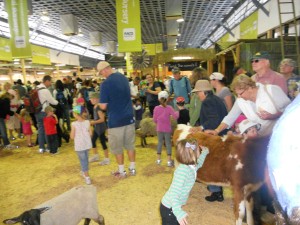No child, or family, should have to go through grief and anguish because they took the kids to a petting zoo at the local fair.
Being repeatedly told they failed because they didn’t wash their hands is  condescending. And ignores the science.
condescending. And ignores the science.
Handwashing is never enough.
There are now 32 people, primarily children, confirmed with shiga-toxin producing E. coli from the Ekka, or Queensland Exhibition, like the state fair in Another 17 suspected cases were awaiting the results of tests.
Authorities say STEC genes were detected in the bedding of animals in the Ekka’s nursery.
And people are being told by the well-paid bureaucrats to wash their hands better.
A Biosecurity Australia dude said, “This highlights the importance of people practising sound hygiene measures following all contact with animals, their body fluids and excretions.”
Queensland Chief Health Officer Jeannette Young said STEC, and similar infections, could be reduced if people washed their hands before and after handling food, and after patting animals, changing nappies and going to the toilet.
“Thorough hand washing with soap and water is the key to preventing the spread of these infections.”
Go hang out at petting zoos or the exhibits at county and state fairs and watch what little kids do; we have. So have others.
As Anderson and Weese found in 2011 at a temporary petting zoo in Guelph using video observation, 58 per cent of visitors performed some form of hand hygiene (either using water, soap and water, or hand sanitizer), and two interventions (improved signage while offering hand  sanitizer, and verbal hand hygiene reminders by venue staff) were associated with increased hand hygiene compliance. U.K. health officials currently recommend handwashing stations with soap and water only (no wipes or sanitizers).
sanitizer, and verbal hand hygiene reminders by venue staff) were associated with increased hand hygiene compliance. U.K. health officials currently recommend handwashing stations with soap and water only (no wipes or sanitizers).
And while some studies suggest inadequate handwashing facilities may have contributed to enteric disease outbreaks or washing hands was protective against illness, others suggest relevant infectious agents may be aerosolized and inhaled.
In the fall of 2009, an E. coli O157:H7 outbreak at Godstone Petting Farm in the U.K resulted in 93 illnesses – primarily little kids.
The investigation into the Godstone outbreak identified evidence of environmental contamination outside the main barn, indicating acquisition of illness through both direct animal or fecal contact, and indirect environmental contact (e.g. contacting railings or soiled footwear).
Aerosolization of potential pathogens is also possible, as suggested in an E. coli O157:H7 outbreak at a county fair in Oregon, in which 60 people fell ill.
As part of the response to the Godstone outbreak, U.K. health types recommended handwashing stations with soap and water only (no wipes or sanitizers, because they don’t work that well under certain conditions).
Ihekweazu et al. subsequently concluded that in the Godstone outbreak,  “handwashing conferred no demonstrable protective effect. …
“handwashing conferred no demonstrable protective effect. …
“Moreover, from the findings of many previous published studies, it must be assumed that all petting or open farms are potentially high-risk environments for the acquisition of VTEC O157 infection (an STEC).”
It’s still 1977 here in Australia; blame the consumer.
A table of petting zoo outbreaks is available at http://bites.ksu.edu/petting-zoos-outbreaks, and a list of risk factors at petting zoos and animal contact events at fairs can be found in: Erdozain G, Kukanich K, Chapman B, Powell D. 2012. Observation of public health risk behaviours, risk communication and hand hygiene at Kansas and Missouri petting zoos – 2010-2011. Zoonoses Public Health.
